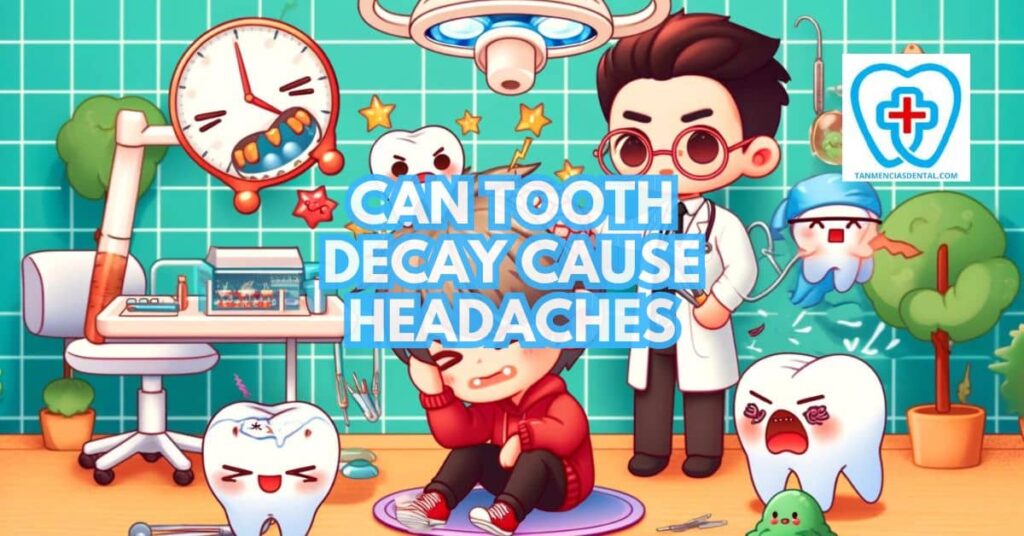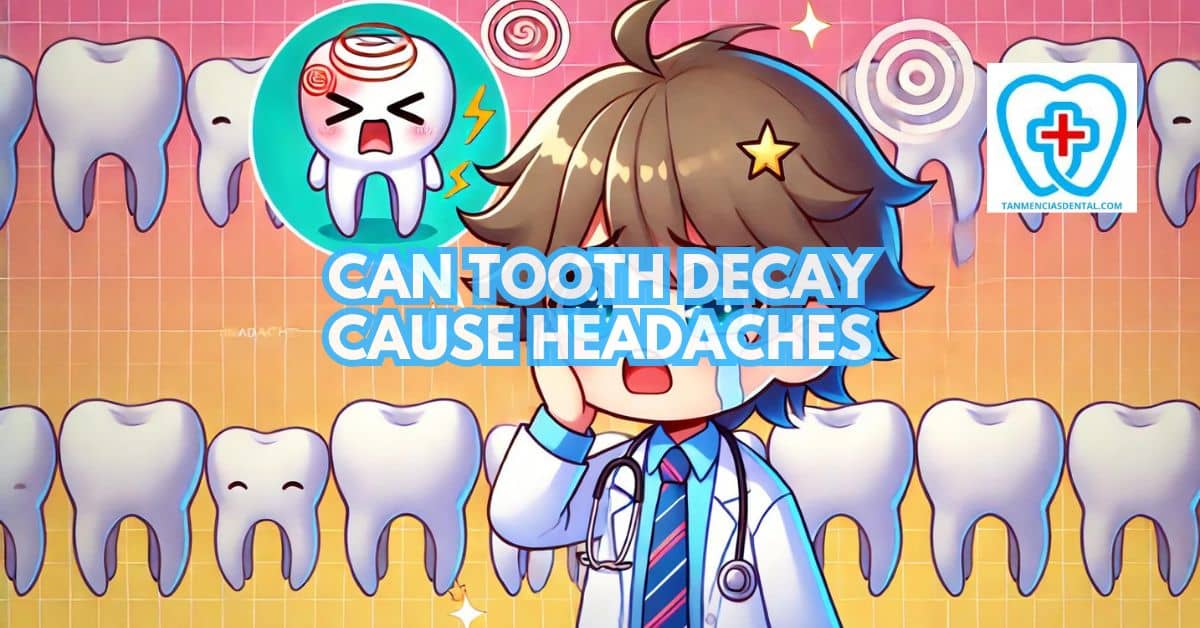Tooth decay is a common problem, but many people don’t realize it can lead to more than just pain in the mouth.
A surprising connection between dental health and headaches often goes unnoticed.
So, can tooth decay cause headaches?
We’ll explore how untreated cavities and other dental issues might be linked to headaches.
Understanding this connection could help you prevent future discomfort and improve your overall well-being.
1. Understanding Tooth Decay and Its Impact on Health
Tooth decay begins with small, demineralized areas on the enamel, but when ignored, these spots can grow into deeper cavities that reach the sensitive inner layers of the tooth.
As the decay progresses, it often causes severe pain and infections, sometimes leading to tooth loss if untreated.
However, the effects of tooth decay are not limited to dental issues; it can also trigger frequent headaches and even migraines.
This happens because the nerves in our teeth are closely linked to the central nervous system, allowing dental pain to radiate to the head.
In some cases, chronic inflammation from tooth decay can exacerbate this pain, contributing to the development of frequent headaches.
Additionally, infections caused by advanced tooth decay can spread, affecting other areas of the body and worsening the overall discomfort.
Understanding the connection between tooth decay and headaches highlights the importance of timely dentistry interventions to prevent these systemic effects.
🦷 What to Expect During a Broken Tooth Root Canal: Your Essential Guide to the Procedure
2. Can Cavities Cause Headaches?
Cavities, caused by decay, can certainly lead to headaches due to the way they affect various parts of the body.
When a cavity reaches the inner layers of the tooth, it can irritate or expose the nerves, triggering pain signals that travel to the brain.
This can result in headaches, especially when the affected teeth are near nerves connected to the skull.
Also, if the cavity affects how you bite down or chew, it can lead to a “bad bite,” causing uneven pressure on the jaw muscles.
With time, this added strain on the jaw muscles can lead to tension headaches or even migraines.
The body’s response to dental pain often creates a ripple effect, impacting areas beyond just the mouth.
This shows how dental health problems can extend beyond the teeth, affecting different parts of the body, especially the head and jaw.
🦷 Drinking Orange Juice After Brushing? Here’s What You Need to Know!
3. The Role of Poor Dental Health in Triggering Headaches
Poor dental health encompasses a range of issues, from cavities to gum disease, infections, and beyond.
These conditions create a constant source of irritation and pain, which can lead to stress on the body’s pain response systems.
In time, this constant stress can manifest as headaches, which are often chronic, as the body tries to cope with the ongoing discomfort.
The inflammation from gum disease, in particular, can release chemicals into the bloodstream that promote pain and possibly trigger headaches.
Maintaining good oral hygiene is therefore not just about keeping your smile bright but also about keeping headaches at bay.
🦷 Dealing with a Broken Tooth Molar? Here’s How to Manage Your Pain Effectively!
4. How Dentists Can Help Identify the Cause of Your Headaches
Dentists are trained to recognize headaches that may stem from dental problems.
They use tools like dental X-rays to check for cavities and infections that could be causing pain.
A bite analysis helps them see if your teeth are misaligned, which can lead to jaw tension and headaches.
Assessing the temporomandibular joint (TMJ) allows dentists to identify disorders that often trigger headaches.
By working with other healthcare professionals, dentists ensure that your headaches are properly diagnosed and treated.
🦷 The Ultimate Guide to Dental Cleaning in Marikina: What Awaits You and How to Prepare

5. How Dental Headaches Manifest
Dental headaches often present themselves as tension-type headaches, characterized by a dull, aching sensation around the forehead, temples, or back of the neck.
These headaches may not initially be severe but can become persistent and increasingly uncomfortable over time.
They often worsen with activities that put pressure on the teeth, such as chewing, biting, or clenching.
This type of headache is frequently misdiagnosed because the connection to dental issues isn’t always clear.
Recognizing dental headaches involves understanding their link to dental health problems and noticing when they occur in relation to dental pain or activities that stress the mouth.
🦷 Unlocking the Secrets of Preventive Dental Care: Essential Solutions for Families
6. Pain: The Common Denominator Between Tooth Decay and Headaches
Pain is the body’s way of signaling that something is wrong, acting as a common thread between tooth decay and headaches.
When tooth decay progresses, it can inflame the sensitive nerves inside the tooth, leading to a painful condition known as toothache.
This pain doesn’t stay localized; it can radiate to other parts of the head, manifesting as headaches.
In addition, the body’s attempt to manage this pain—through changes in posture, jaw clenching, or other compensatory behaviors—can lead to muscle tension and further headaches.
Essentially, the pain from tooth decay sets off a chain reaction, culminating in headaches that can become as debilitating as the toothache itself.
🦷 Thinking About a Prosthodontic Procedure? Key Considerations You Can’t Ignore!
7. The Connection Between Rotting Teeth and Headaches
Rotting teeth, or severe tooth decay, can lead to infections that not only cause immense pain but can also be a direct source of headaches.
As decay penetrates deeper into the tooth, it can reach the pulp, where nerves and blood vessels become infected and inflamed.
This inflammation can cause pressure buildup inside the tooth, which may then lead to referred pain in the form of a headache.
Furthermore, the infection can spread to surrounding tissues and even enter the bloodstream, potentially increasing the risk of headaches.
Addressing rotting teeth promptly is critical not only for oral health, but also for preventing the spread of infection and associated headaches.
🦷 Understanding Black Plaque on Teeth: Uncovering Causes and Essential Prevention Tips
8. Teeth Grinding, TMJ, and Headaches: A Painful Trio
Teeth grinding (bruxism) and TMJ (temporomandibular joint disorders) form a troubling combination that often results in headaches.
Bruxism, particularly when it occurs during sleep, can put excessive stress on the teeth and jaw, leading to TMJ disorders.
These disorders are characterized by pain and dysfunction in the jaw joint and muscles controlling jaw movement, which can cause a type of headache known as a TMJ headache.
These headaches are usually felt in the temples, jaw, or ear area.
They can also be accompanied by a clicking or popping sound in the jaw when opening or closing the mouth.
Managing these conditions often requires a multidisciplinary approach, including dental and medical interventions, to alleviate the pain and prevent further headaches.
🦷 Why Dental Cleanings Matter: Let’s Discover Their Importance Together!
9. Toothache: A Precursor to Headaches
A toothache often serves as an early warning sign of potential headaches.
Pain from a toothache caused by decay or infection can radiate from the affected tooth to other parts of the head, leading to or exacerbating headaches.
The intensity of a toothache can vary, but even minor tooth pain can escalate into significant headaches if the underlying issue is not addressed.
This direct relationship underscores the importance of not ignoring toothaches, as they can be indicators of more serious dental health problems that might lead to headaches.
Prompt treatment of a toothache can prevent it from becoming a source of chronic headaches, highlighting the interconnectedness of oral and overall head health.
🦷 Cracked Crown? Understanding the Causes and What You Should Know!
10. Preventing Dental Health Problems to Avoid Headaches
Preventing dental health problems is key to avoiding headaches related to tooth decay and other oral health issues.
Regular dental checkups are crucial for the early detection and treatment of decay, preventing it from leading to more serious conditions like cavities and infections that can cause headaches.
Good oral hygiene practices, including brushing twice a day, flossing daily, and limiting sugary foods and drinks, can significantly reduce the risk of tooth decay.
Plus, using a mouthguard for those who grind their teeth can prevent the headaches associated with bruxism and TMJ disorders.
These preventative measures not only help to maintain dental health but also contribute to overall well-being by reducing the risk of dental-related headaches.
🦷 Can Tooth Decay Cause Acne? Exploring the Surprising Connection!
11. Treating Tooth Decay to Alleviate Headaches
When tooth decay is identified as a contributing factor to headaches, treating the decay can provide significant relief.
This treatment might include fillings to repair cavities, root canal treatment to address nerve damage, or even tooth extraction in severe cases.
Modern dental techniques ensure that these treatments are as comfortable and effective as possible, addressing the root cause of pain directly.
In many cases, patients report a noticeable reduction in headache frequency and intensity following dental treatment.
This improvement emphasizes the effectiveness of treating dental issues, not only to protect oral health but also to alleviate related headaches.
🦷 Avoiding Common Mistakes: Essential Tips for Brushing Your Toddler’s Teeth!
👨⚕️ Conclusion
The connection between dental health and headaches is clear and significant.
By understanding how tooth decay and other dental problems can lead to headaches, individuals can take proactive steps to maintain their oral health and, by extension, reduce their headache risk.
Regular dental care, coupled with good oral hygiene practices, plays a critical role in preventing tooth decay and the associated discomfort and headaches.
Addressing dental health problems promptly not only alleviates pain but also enhances overall quality of life.
Ultimately, taking care of one’s dental health is a vital step in preventing headaches, illustrating the inseparable link between oral health and general well-being.
😊 Self-Promotion
Discover a brighter, healthier smile at Tan-Mencias Dental Clinic, nestled in the heart of Parang, Marikina City!
Our friendly team is dedicated to providing you with the utmost care and personalized dental services in a welcoming environment.
Have questions or concerns?
Feel free to reach out to us in the way that suits you best: give us a call at 9171451074, send us a message through our Facebook page, or use the contact form on our website.
Let us be your partners in achieving optimal dental health and a dazzling smile—we’re just a message or call away!

